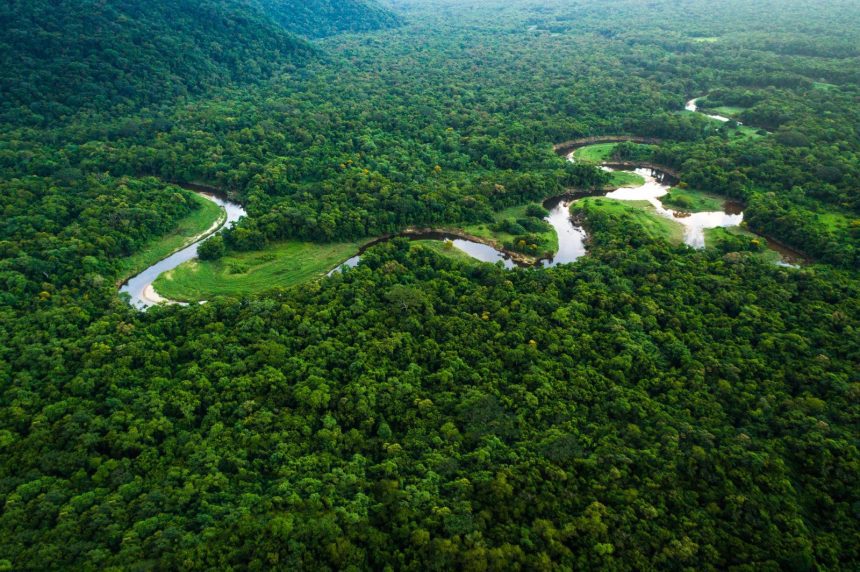The Brazilian Development Bank (BNDES) has mobilized R$ 7 billion since 2023 for the conservation, restoration, and sustainable management of Brazilian forests. The announcement was made by the bank’s president, Aloizio Mercadante, on Thursday, November 6, during the Belém Climate Summit (Cúpula do Clima de Belém).
It is the largest forest-sector investment in BNDES’s history, combining reimbursable and non-reimbursable instruments, credit lines, guarantees, concessions, and productive support.
The funds support projects across all of Brazil’s biomes, reinforcing the country’s position as a global leader in forest restoration and native-species bioeconomy. In concrete terms, the R$ 7 billion mobilized will enable the planting of 283 million trees, recovery of 168,000 hectares, creation of 70,000 jobs, and capture of 54 million tons of CO₂e, equivalent to three years without cars on the streets of São Paulo.
“We are transforming the Deforestation Arc into the Restoration Arc. At COP28, we pledged to mobilize R$1 billion for this program. Today, we have reached around R$ 7 billion for reforestation, equivalent to planting 283 million trees and capturing 54 million tons of CO₂ from the atmosphere. Brazil is proving that it’s possible to restore the planet while developing the green economy,” said Aloizio Mercadante, during the session on Climate and Nature.
BNDES Florestas: a new platform for transparency and scale
Recently launched, BNDES Florestas serves as an umbrella platform to organize and bring transparency to the bank’s forest-related initiatives.
The platform consolidates programs such as Floresta Viva (phases 1 and 2), Arco da Restauração, and Restaura Amazônia (with resources from the Amazon Fund), along with BNDES Florestas Inovação, BNDES Florestas Crédito, and ProFloresta+ — the latter in partnership with Petrobras. It also includes credit operations under the Climate Fund, aimed at ecological restoration, productive chain development, and carbon-credit-linked financing.
Large-scale investments and territorial impact
The BNDES initiatives span from ecological and productive restoration, financed through the Climate Fund, to technological innovation programs and public-private partnerships.
The Climate Fund has already approved or contracted R$1.9 billion in credit for 14 projects focused on restoration, silviculture, and the management of native species, leveraging R$5.7 billion in associated private investments.
“This is an economically sustainable and productive program that attracts private investors. It proves that those who want to invest in the green economy cannot have their balance sheets in the red. Brazil has everything it takes to become the world’s largest restoration hub, and I want to make BNDES available to share expertise, technology, and partnerships. Beyond avoiding deforestation, we must rebuild Brazil’s forests,” said Mercadante.
The Restoration Arc: turning commitments into action
In the Amazon, the Restoration Arc (Arco da Restauração), launched in partnership with the Ministry of the Environment and Climate Change (MMA) at COP28 with an initial R$1 billion investment, has already mobilized R$ 2.4 billion in reforestation actions in less than two years.
As part of this effort, the Restaura Amazônia program, with R$500 million in non-reimbursable funds (R$450 million from the Amazon Fund and R$50 million from Petrobras), supports agroforestry systems and restoration projects in degraded areas — focusing on Indigenous lands, settlements, and conservation units.
The 45 projects already selected include restoration efforts in at least nine conservation units, 80 rural settlements, and 39 Indigenous territories, strengthening environmental recovery in key regions.
On the innovation front, BNDES Florestas Inovação is investing R$30.8 million, in partnership with Embrapa and UFSCar, to develop technologies for native species silviculture, from genetic improvement to forest management.
Brazil leads the new forest economy
With R$7 billion mobilized and dozens of projects underway, BNDES reinforces its role as a driving force behind Brazil’s ecological transition and forest-based bioeconomy.
The bank demonstrates that it is possible to combine conservation, income generation, and sustainable development, positioning Brazil as a global leader in forest restoration and the green economy.
“Forest restoration is a nature-based solution, a technology humanity already masters, and it has proven extremely effective at capturing carbon. But it goes further: it helps rebuild biodiversity, generate jobs and income, and restore community life through the forest,” concluded Mercadante.







